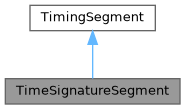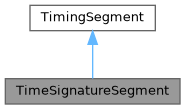|
| auto | GetType () const -> TimingSegmentType override |
| |
| auto | GetEffectType () const -> SegmentEffectType override |
| |
| auto | IsNotable () const -> bool override |
| |
| void | DebugPrint () const override |
| |
| auto | Copy () const -> TimingSegment *override |
| |
|
| TimeSignatureSegment (int iStartRow=ROW_INVALID, int iNum=4, int iDenom=4) |
| |
|
| TimeSignatureSegment (const TimeSignatureSegment &other) |
| |
|
auto | GetNum () const -> int |
| |
|
void | SetNum (int num) |
| |
|
auto | GetDen () const -> int |
| |
|
void | SetDen (int den) |
| |
|
void | Set (int num, int den) |
| |
| auto | ToString (int dec) const -> std::string override |
| |
| auto | GetValues () const -> std::vector< float > override |
| |
| auto | GetNoteRowsPerMeasure () const -> int |
| | Retrieve the number of note rows per measure within the TimeSignatureSegment.
|
| |
|
auto | operator== (const TimeSignatureSegment &other) const -> bool |
| |
| auto | operator== (const TimingSegment &other) const -> bool override |
| |
|
| TimingSegment (int iRow=ROW_INVALID) |
| |
|
| TimingSegment (float fBeat) |
| |
|
| TimingSegment (const TimingSegment &other) |
| |
| virtual void | Scale (int start, int length, int newLength) |
| | Scales itself.
|
| |
|
auto | GetRow () const -> int |
| |
|
void | SetRow (int iRow) |
| |
|
auto | GetBeat () const -> float |
| |
|
void | SetBeat (float fBeat) |
| |
|
auto | operator< (const TimingSegment &other) const -> bool |
| |
|
virtual auto | operator!= (const TimingSegment &other) const -> bool |
| |
Identifies when a song changes its time signature.
This only supports simple time signatures. The upper number (called the numerator here, though this isn't properly a fraction) is the number of beats per measure. The lower number (denominator here) is the note value representing one beat.
| auto TimeSignatureSegment::GetNoteRowsPerMeasure |
( |
| ) |
const -> int
|
|
inline |
Retrieve the number of note rows per measure within the TimeSignatureSegment.
With BeatToNoteRow(1) rows per beat, then we should have BeatToNoteRow(1)*m_iNumerator beats per measure. But if we assume that every BeatToNoteRow(1) rows is a quarter note, and we want the beats to be 1/m_iDenominator notes, then we should have BeatToNoteRow(1)*4 is rows per whole note and thus BeatToNoteRow(1)*4/m_iDenominator is rows per beat. Multiplying by m_iNumerator gives rows per measure.
- Returns
- the number of note rows per measure.


 Public Member Functions inherited from TimingSegment
Public Member Functions inherited from TimingSegment Static Public Attributes inherited from TimingSegment
Static Public Attributes inherited from TimingSegment